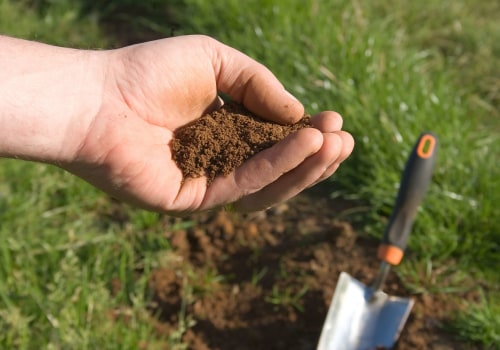Soil amendments are a great way to improve the quality of soil and provide essential nutrients for plants to thrive. Inorganic soil amendments, such as fertilizers, lime, and gypsum, are commonly used to improve soil structure, increase aeration, reduce compaction, and increase the availability of nutrients. In this article, we'll look at the benefits of using inorganic soil amendments in your garden or landscaping project. Inorganic soil amendments provide essential nutrients to plants and help support healthy root development. They can also help improve soil structure and reduce compaction, making it easier for plants to take up nutrients from the soil.
Additionally, inorganic amendments can help reduce the pH of acidic soils, making it easier for plants to absorb essential nutrients. In addition to providing essential nutrients, inorganic soil amendments can also help improve drainage and aeration. By improving drainage and aeration, you can create an environment that is more conducive to healthy root growth and water retention. This can help reduce the need for frequent watering and prevent the soil from becoming too dry. Finally, inorganic soil amendments can also help promote beneficial microbial activity in the soil. By providing essential nutrients and creating an environment that supports healthy microbial activity, inorganic amendments can help improve the overall health of your garden or landscaping project. Overall, inorganic soil amendments are a great way to improve soil quality and provide essential nutrients for plants to thrive.
Whether you're looking to improve drainage and aeration or provide essential nutrients, inorganic amendments are a great choice for your garden or landscaping project. Inorganic soil amendments have a number of benefits. They can help to improve the drainage of the soil, increase its water retention capacity, and increase the amount of organic matter available. They can also help to reduce compaction and improve the texture of the soil, making it easier for plants to access the nutrients they need. Additionally, inorganic soil amendments can provide essential minerals and nutrients that may not be available in your local environment.
For example, gypsum is an inorganic soil amendment that helps to improve drainage and water retention in clay soils. It also provides calcium, which can help to increase crop yields. Rock phosphate is another inorganic soil amendment that helps to improve soil fertility by providing phosphorus and calcium to the soil. When using inorganic soil amendments, it is important to follow the manufacturer’s instructions carefully. This will help ensure that you are applying the right amount of amendment and in the correct way.
It is also important to check the pH level of your soil before adding any amendments, as this can affect how effective they are. Overall, inorganic soil amendments can be an effective way to improve the structure and fertility of your soil. They can provide essential minerals and nutrients, improve drainage and water retention, and reduce compaction. When used correctly, they can help to ensure that your plants have access to the resources they need to thrive.
How to Use Inorganic Soil Amendments
Inorganic soil amendments are a great way to improve the structure and fertility of your soil. When using them, it is important to follow the manufacturer's instructions carefully and check the pH level of your soil before adding any amendments.The type of amendment you use will depend on the condition of the soil, and what type of nutrients you need to add. For example, if you want to increase the fertility of your soil, you may use a fertilizer or compost. If you need to improve the structure of the soil, you may use gypsum, lime, or peat moss. When applying an inorganic soil amendment, it is important to use the right amount.
If you use too much, it can damage your plants and lead to poor plant growth. It is also important to spread the amendment evenly over the soil surface and mix it into the top few inches of soil. In addition, it is important to consider how long you will be using the amendment in your soil. Some amendments may need to be reapplied regularly, while others may stay in your soil for a longer period of time.
In conclusion, inorganic soil amendments can be a great way to improve the structure and fertility of your soil. However, it is important to follow manufacturer's instructions and check the pH level of your soil before adding any amendments.
The Benefits of Inorganic Soil Amendments
Inorganic soil amendments have a number of benefits that can help to improve the structure and fertility of the soil. These include improved drainage, water retention, organic matter availability, reduced compaction, improved texture, and essential minerals and nutrients. Improved drainage is one of the most important benefits of inorganic soil amendments. By adding amendments like gravel, sand, and other materials, the soil can become less dense and more porous.This allows water to flow more freely through the soil, reducing waterlogging and improving aeration. Water retention is also improved by inorganic soil amendments. By adding materials like clay and gypsum, the soil can absorb more water and hold it for longer periods of time. This helps to ensure that plants can access the water they need even during dry spells. Organic matter availability is another benefit of inorganic soil amendments.
By adding materials such as compost, manure, and other organic materials, the soil can become more rich in organic matter which helps to improve fertility. Inorganic soil amendments can also help to reduce compaction. By adding materials such as gravel or sand, the soil can become less dense and more able to withstand heavy pressure from machinery or animals. This can help to reduce compaction over time and improve the overall structure of the soil. Finally, inorganic soil amendments can improve the texture of the soil.
By adding materials such as sand or vermiculite, the soil can become finer and more conducive to growing healthy crops. In addition, inorganic soil amendments can also provide essential minerals and nutrients that are necessary for plant growth. In conclusion, inorganic soil amendments can be an effective way to improve the structure and fertility of your soil. When used correctly, they can help to ensure that your plants have access to the resources they need to thrive. Inorganic soil amendments provide numerous benefits, including improved soil structure, increased fertility, and improved water retention.
Furthermore, they can also help to reduce soil erosion and the risk of plant diseases. By understanding the benefits of inorganic soil amendments and how they can be used correctly, you can ensure that your plants are getting all the nutrients they need for healthy growth and productivity.











Leave a Comment